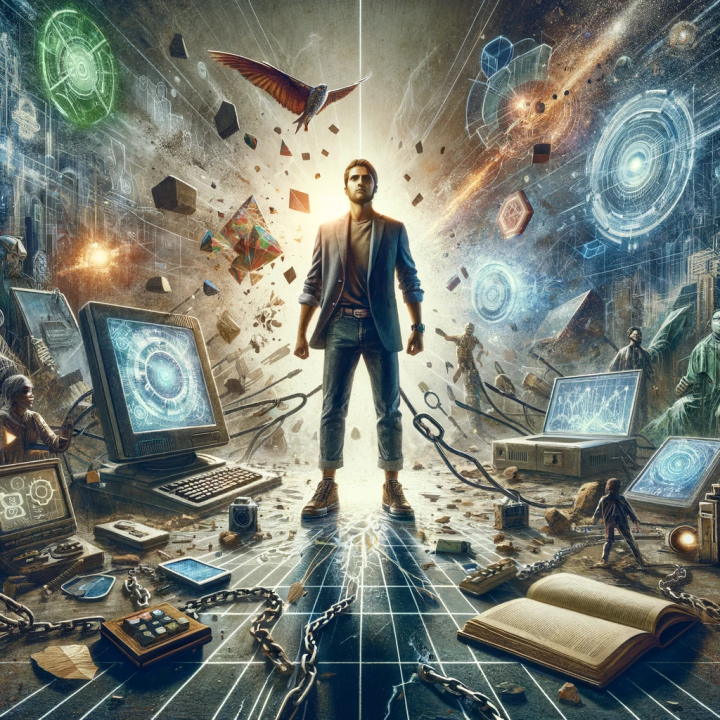3 Technological Orthodoxies Crumbling in the Face of Generative AI
Hold onto your hard drives, folks, because Generative AI (#GenAI) is shaking the very foundations of our technological thinking. This isn't your grandfather's AI—it's no longer just analyzing data. It's it’s gone multi-modal with uncanny human-like fluency.
And this begs the question:
Are you, as a business leader, prepared for the paradigm shift it brings? Are you, as an educator, helping your students prepare for what they get to meet outside of the school walls?
Let's crack open three long-held technological orthodoxies that GenAI is forcing us to re-evaluate.
1. Automation = Job Losses:
Fear of robots stealing jobs is as old as science fiction itself. But here's the reality: a McKinsey Global Institute study predicts that while 800 million jobs could be displaced by automation by 2030, 950 million NEW ones will be created. GenAI won't eliminate all jobs; it will transform them. At the same time, Gartner estimates that employees who believe that their jobs can be replaced by AI have a 27% lower intent to stay in their organization. You do the math for your business. For a 10,000 employee organization, that can mean 53 mio USD per year in total costs and lost productivity. Regardless of which scenario you find most realistic, you are up for a challenge!
The key, that comes with huge urgency, is to embrace reskilling and upskilling of your workforce to leverage GenAI's creative and analytical power. Look for AI Literacy when you visit my overview of the 60 most important human skills for anyone’s “Human Operating System” -for the decades to come.
Imagine not only your marketing team empowered by AI-generated personalized content of stellar quality, or designers collaborating with AI-powered tools to create revolutionary products. The possibilities are mind-boggling and you cannot afford to miss this boat. Are you too believing you should cut away xx% of our organization and try to recruit the top talent everyone talks about or replace them with AI? If so, you should challenge this technological orthodoxy again.
2. Data is King:
Sure, data has fueled innovation for decades. But GenAI throws a curveball. Now, it can generate synthetic data with eerily accurate real-world characteristics. This opens doors to training AI models on vast, simulated datasets, bypassing the constraints of limited real-world data. A Stanford study showed synthetic data improved AI performance by 10-30% in image recognition tasks. Imagine the implications for industries like healthcare, where patient privacy often restricts access to real-world data. In Higher Education (and primary/secondary Education as well), the generation of training data sets will be easier and make everyones' dream of an AI Tutor to really copilot teachers and faculty in a massive table-turning way, happen just about… NOW. GenAI could unlock breakthroughs without ethical concerns, although your job is to take care of the ethical values if you have such. At board level, do you have your values, vision and strategy in place to ensure everything AI-related your organization is doing stays within your ethical guardrails? Another orthodoxy to crack open today rather than tomorrow!
3. Humans are the Creative Force:
We pride ourselves on our creativity, but even that's under GenAI's scrutiny. We now see photorealistic videos created by GenAI’s “simply” based on your text prompting (OpenAI's Sora is making waves this moment),
while AI composers are churning out symphonies indistinguishable from human-made ones. Does this mean robots will write the next great novel? Perhaps not, but it challenges our definition of creativity.
Instead of fearing obsolescence, you must help your organization as well as your private community start to see GenAI as a collaborator, amplifying our creative capacity by generating ideas, iterating on them, and freeing us to focus on the uniquely human aspects of art and innovation.
What might happen -worst case scenario- if everyone around you gets paralyzed by "AI-fear"? We tend to make irrational decisions when we are afraid or simply don't understand what is happening. So this is a major paradigm shift that must happen within each of us. Cracking this technological orthodoxy open in full collaboration and conversation with people around you is going to be critically important for your transformation.
These are just the tip of the iceberg. The rapid evolution of GenAI demands a proactive approach from business leaders. Challenge these orthodoxies, explore the possibilities, and most importantly, get ready to harness the power of this transformative technology. It's not about robots taking over; it's about co-creating a future where human ingenuity and AI's boundless potential work together to solve the world's biggest challenges.
Are you ready for the Generative AI revolution? Share your thoughts in the comments below!
Bonus Thought: A recent World Economic Forum report estimates the global GenAI market will reach $1.56 trillion by 2030. Is your organization positioned to claim its share?
Remember, the future is not written in data. It's created in imagination. Let's co-create it wisely.
I was inspired for this article by Fernando De los Ríos’s article titled "Bold Innovation Without Borders: Challenging the Global Age -that should be read over here: https://www.linkedin.com/pulse/bold-innovation-without-borders-challenging-global-age-de-los-ríos-tkkhe/ ". In the article, De los Ríos highlights the importance of challenging technological orthodoxies for businesses to stay competitive in this rapidly evolving global age.
If you are looking for a professional community where everyone collaborates on challenging the above, and many more orthodoxies, then look no further than the Coach Companion network. You will also find Fernando there. Read more here and join if you seek a fellowship for turning dreams rather than fears into new strategies.
I wish you the most supportive tailwinds as you challenge your technological orthodoxies!
Yours in transformation,
Lars
